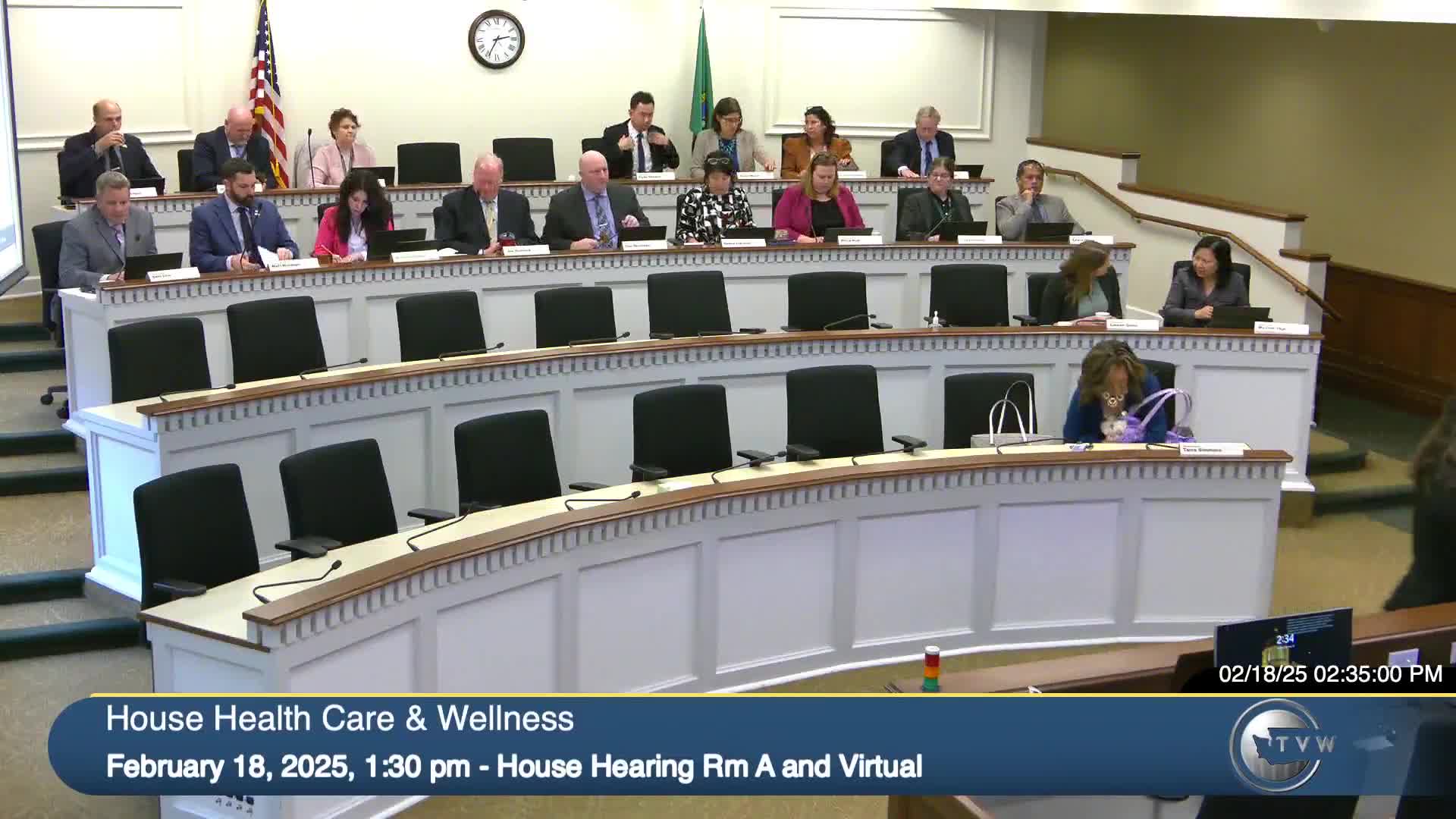Committee advances seven health bills; key votes recorded

Summary
The House Health Care & Wellness Committee on the day recorded votes to move seven bills out of committee, from an overhaul of an all‑payers claims database to changes in how Medicaid behavioral‑health contracts are planned.
The House Health Care & Wellness Committee on the day recorded votes to move seven bills out of committee, from an overhaul of an all‑payers claims database to changes in how Medicaid behavioral‑health contracts are planned.
The measures reported out included House Bill 13 82 (all‑payers claims database modernization), House Bill 14 22 (drug take‑back program fee and operations), House Bill 14 27 (peer specialist billing expansion), House Bill 14 32 (mental‑health parity and utilization review requirements), House Bill 15 83 (Medicaid waiver to cover traditional health practices), House Bill 17 84 (certified medical assistant order activation), and House Bill 18 13 (behavioral‑health procurement transition planning).
Why it matters: The items touch core health‑system functions — price transparency, behavioral‑health delivery, workforce scope, and access to traditional and culturally specific care — and several include technical changes that will affect procurement, contracts and insurer requirements if enacted.
Key outcomes and notable debate
- House Bill 13 82 — All‑payers claims database modernization: Reported out with a due‑pass recommendation, 12 ayes, 7 nays. The bill removes a federal‑policy conflict by aligning state rules with federal guidance, eliminates a prior restriction on proprietary financial information, allows the Health Care Authority (HCA) to contract competitively for a LO (data steward), and changes certain reporting frequencies. Opponents warned the removal of limits on proprietary financial information could raise prices; supporters argued modernization adds consumer transparency. Representative Thuringer urged support, saying the modernization “is important information…to provide transparency to health care costs.” Representative Schmick voted against, citing concerns about proprietary financial data.
- House Bill 14 22 — Drug take‑back program fee changes: Reported out with a due‑pass recommendation, 12 ayes, 7 nays. The substitute removed a 10% fee cap and replaced an immediate competitive reprocurement requirement with updated reporting and guardrails; sponsors said the change is needed to keep the program solvent. Representative Macri said the cap made the program “unsustainable over time.” Opponents sought tighter statutory cost controls; an amendment to add a fixed fee failed.
- House Bill 14 27 — Peer specialist billing/expansion: Reported out 15 ayes, 4 nays. The bill expands opportunities to bill insurance for peer specialist services and aligns implementation with budget realities; sponsors said it helps replace state general‑fund reliance for some peer services.
- House Bill 14 32 — Mental‑health parity and utilization review: Reported out 15 ayes, 4 nays. The proposed substitute would apply parity rules and utilization review standards to fully insured plans, limit prior‑authorization for initial outpatient mental‑health/SUD visits, require age‑appropriate criteria for utilization reviews, and delay the effective date to Jan. 2027 to allow insurers and the Office of the Insurance Commissioner (OIC) to prepare. Supporters described it as an incremental step to improve access; opponents raised concerns about extending requirements before state employee plans are covered.
- House Bill 15 83 — CMS 1115 waiver for traditional health practices: Reported out unanimously, 19 ayes. The amendment added urban Indian organizations to provider types authorized to deliver covered traditional health practices if CMS approves the waiver; sponsors said the change strengthens tribal and urban Indian participation.
- House Bill 17 84 — Certified medical assistant orders: Reported out unanimously, 19 ayes. The substitute clarifies when certified medical assistants may enter and “activate” orders under standing written protocols, reduces administrative burdens on clinicians, and preserves patient safety safeguards; one later amendment restoring same‑day supervisory review was withdrawn and the substitute adopted after stakeholder negotiations.
- House Bill 18 13 — Medicaid behavioral‑health reprocurement planning: Reported out 18 ayes, 1 nay. An amendment removed a mandatory competitive reprocurement and instead requires HCA to develop a strategic plan for transition, explicitly including tribes and Indian health clinics and focusing the change on behavioral‑health crisis stabilization services, mobile crisis and other specific programs.
Votes at a glance (final motions reported out of committee)
- HB 13 82: Reported out (due pass). Tally: 12 ayes, 7 nays. - HB 14 22 (substitute as amended): Reported out (due pass). Tally: 12 ayes, 7 nays. - HB 14 27 (substitute): Reported out (due pass). Tally: 15 ayes, 4 nays. - HB 14 32 (substitute): Reported out (due pass). Tally: 15 ayes, 4 nays. - HB 15 83 (substitute): Reported out (due pass). Tally: 19 ayes, 0 nays. - HB 17 84 (substitute): Reported out (due pass). Tally: 19 ayes, 0 nays. - HB 18 13 (substitute): Reported out (due pass). Tally: 18 ayes, 1 nay.
What’s next: Each bill will move to the full House calendar for further consideration. Several measures include delayed effective dates or required rule‑making, and some require federal approvals (for example, the 1115 waiver in HB 15 83).

